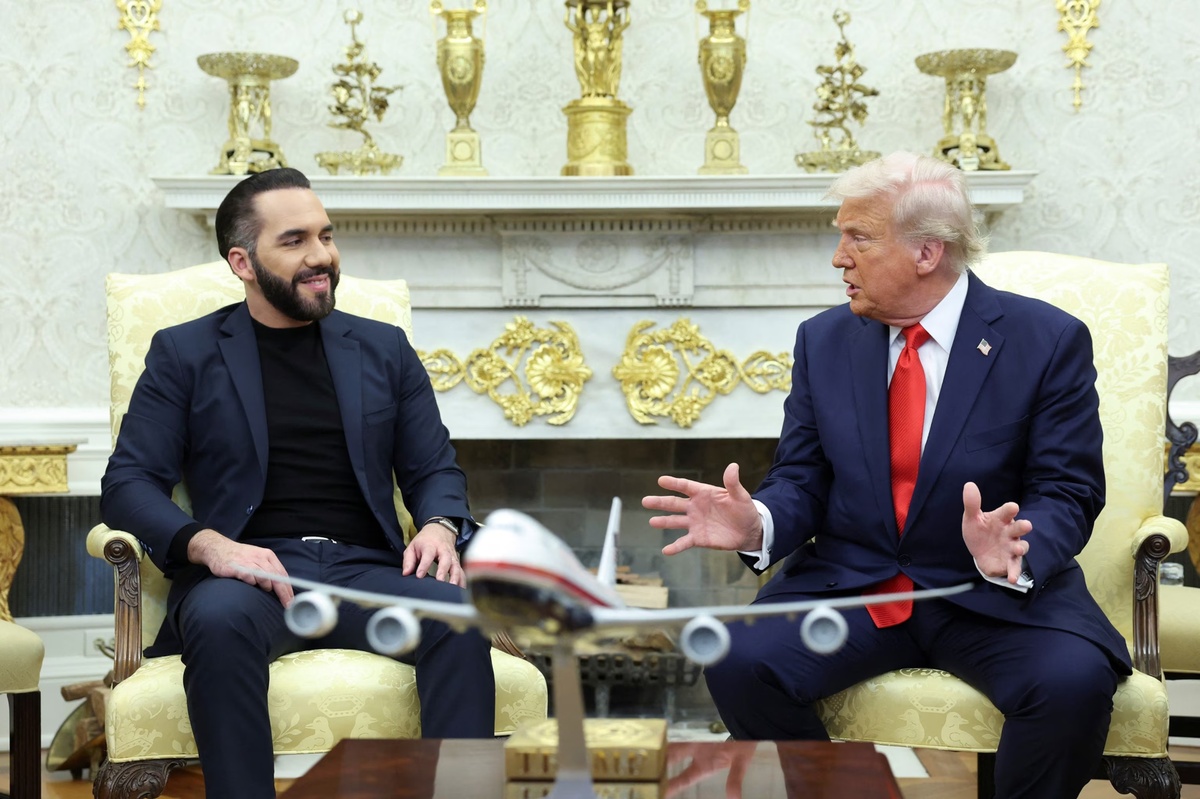Physical Address
304 North Cardinal St.
Dorchester Center, MA 02124
Physical Address
304 North Cardinal St.
Dorchester Center, MA 02124

On April 14, 2025, President Donald Trump welcomed El Salvador’s President Nayib Bukele to the White House. T
he meeting marked the first Oval Office visit by a Latin American leader since Trump returned to office, and it showcased a growing partnership rooted in aggressive migration enforcement, tough-on-crime rhetoric, and controversial legal ideas.
Takeaway: Trump and Bukele are cementing a high-stakes alliance—praised by some, condemned by others.

The two leaders doubled down on deportation policies. El Salvador continues to accept hundreds of alleged gang members, including Venezuelans and Salvadorans, deported from the U.S.
But the spotlight landed on the Kilmar Abrego García case—a Maryland man with no criminal record, wrongly deported and detained in El Salvador’s mega-prison CECOT.
Despite a Supreme Court order for his return, Bukele and Trump refused to comply. Bukele called him a terrorist. Trump’s team said the court had no jurisdiction over foreign policy.
Takeaway: Deportation policy isn’t just aggressive—it’s now openly defying legal norms.
Trump floated a radical idea: jailing violent American criminals in El Salvador. While legally murky—and likely unconstitutional—the proposal is reportedly being explored inside his administration, alongside talks of denaturalization for certain U.S. citizens.
Takeaway: The idea of outsourcing incarceration adds a provocative layer to Trump’s immigration agenda.

The Biden and Trump administrations both used detention deals with foreign governments, but this one stands out. The U.S. agreed to pay El Salvador $6 million to hold deported individuals in its prisons, including members of groups like MS-13 and Tren de Aragua.
Critics call these facilities human rights black holes, pointing to allegations of torture and indefinite detentions.
Takeaway: U.S. tax dollars are now funding controversial detention practices abroad.
Bukele praised Trump’s border wall and detention efforts.
Both leaders emphasized their belief in “results over rules,” touting Bukele’s policies that cut El Salvador’s homicide rate from over 2,000 in 2019 to just 114 in 2024.
Meanwhile, over 85,000 people have been arrested under Bukele’s emergency powers—fewer than 2% have been convicted.
Takeaway: Crime is down, but at a serious cost to due process and human rights.

The U.S. Supreme Court recently ruled that deportations under the 1798 Alien Enemies Act must include due process. But enforcement remains inconsistent.
Legal experts warn the Trump-Bukele approach could erode long-standing constitutional protections, especially if expanded to U.S. citizens.
Takeaway: This partnership is forcing a national debate on legal limits, sovereignty, and the rule of law.
Bukele’s popularity remains high—80% approval—and other leaders in Latin America are watching closely. Trump’s embrace of Bukele signals a regional strategy among MAGA-aligned Republicans, reinforcing strongman tactics as a model for “law and order.”
Takeaway: The U.S. isn’t just influencing foreign leaders—it’s being influenced right back.
The Trump–Bukele meeting revealed a high-risk, high-reward strategy—one rooted in aggressive enforcement and blurred legal lines. While some hail the results in crime reduction, others warn of a dangerous erosion of U.S. legal standards and human rights norms.
Takeaway: Trump and Bukele’s alliance is reshaping migration policy—and pushing the boundaries of U.S. law.
Daily News. No B.S. No Fluff. Just What You Need to Know.